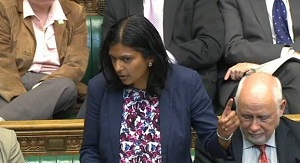Rupa Huq Calls on Ukraine Mass Killings to Be Recognised as Genocide
Millions deliberately starved to death by Stalin’s Soviet government
Rupa Huq MP for Ealing Central and Acton has raised the issue of mass killing of people in Ukraine in House of Commons after attending a remembrance ceremony in her constituency. She has asked the government to officially recognised the deliberate starving to death of millions of Ukrainians in 1933 by Stalin's Soviet authorities.
Dr Huq, Shadow Cabinet minister for Home Affairs, attended a special service and wreath-laying ceremony at the Ukrainian Autocephalous Orthodox Church in Newton Avenue, Acton on Saturday 26 November to commemorate the anniversary of the millions of the deaths. She made a speech to parishioners, priests, the Ukrainian Ambassador to the UK Natalia Galibarenko and representatives of community organisations after a wreath-laying ceremony and a short service of remembrance to commemorate the Holodomor famine on Ukraine’s national remembrance day.
After speaking to older parishioners who lived in Ukraine at the time of the famine and looking at a photographic exhibition dedicated to victims, she said: “My eyes were opened to this appalling atrocity. I owe it to this community, to my Ukrainian constituents, to have the suffering and deaths of their fellow citizens officially recognised.”,
She asked a question in parliament on Thursday 1 December, to urge the UK government to recognise Ukraine’s “forced famine of 1932-33” as genocide. Her visit to the church in Acton and the parliamentary question has received substantial coverage in Ukraine.
She said, “Mr Speaker – on Saturday I was amongst the congregation of hundreds within the Ukrainian Orthodox Church in South Acton, to mourn up to 10 million who died in Stalin’s forced famine of 1932-33. It’s an atrocity that was exposed by British journalist, yet the British Government still fails to acknowledge this as Genocide. Could we please have an urgent statement on why we haven’t followed the other countries in doing this? There was a progress under Blair/ Brown government but with so many matters, things seem to have stalled since. These people felt swept under the carpet and they need our solidarity and they are under attack again.”
Rt Hon David Lidington MP, Lord President of the Council and Leader of the House of Commons (Aylesbury, Conservative Party) have addressed the question as follows, “With all due respect, this was not recognized as Genocide under those Governments. The principal that the Government follows, is that we believe that the term “genocide” these days carries potentially criminal implications in respect to those alleges who carried out genocide act. These are decisions that should be made by judges rather than by governments. But that should not diminish in any way our sense of horror at what happened in Ukraine during 1930s. I can remember when I was in Kyiv, going to see Holodomor memorial, in the centre of the city, and the folk memory of that abhorring experience is still very central to Ukrainian’s conception of themselves as people and as a nation. We are right to remember the horror that took place then and do all in our part to make sure though our foreign policy that such events never happen again.”
This is not the first time that politicians have tabled questions about this topic in parliament. Previous questions from MPs, particularly on the eve of the 75th anniversary in 2008, led to the Home Office recognising the Holodomor as a “crime against humanity” yet stopping short of using the term “Genocide”.
December 8, 2016
Related links
|
